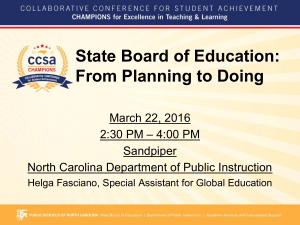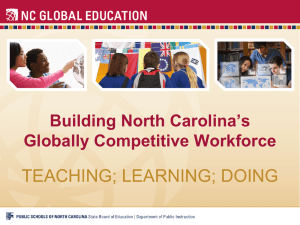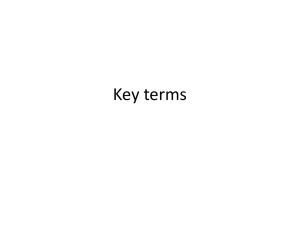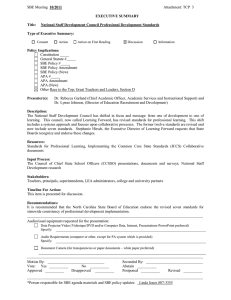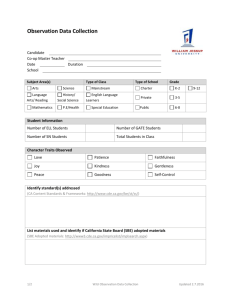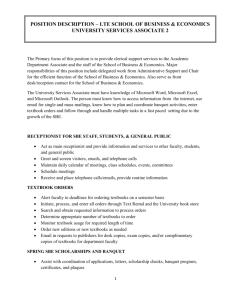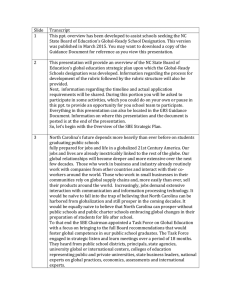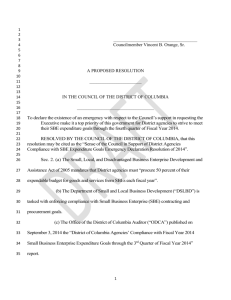State Board of Education: From Planning to Doing March 22, 2016 10:00-11:30 AM
advertisement
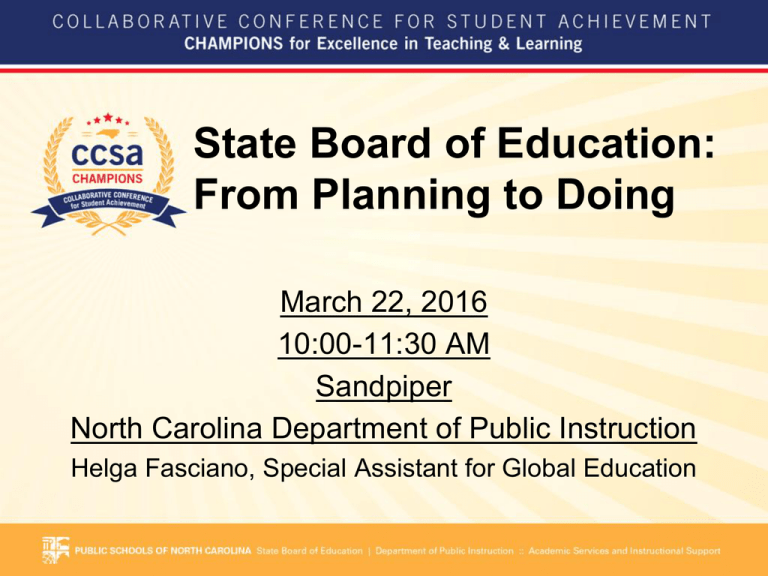
State Board of Education: From Planning to Doing March 22, 2016 10:00-11:30 AM Sandpiper North Carolina Department of Public Instruction Helga Fasciano, Special Assistant for Global Education Agenda •Global Educator Digital Badge •Dual Language/Immersion K-12 Expansion •Global Languages Endorsement (9-12) •Global-Ready Schools (GRS) Rubric and Application Requirements •Contact and Resources SBE Task Force on Global Education In 2011, North Carolina State Board of Education Chairman appointed 5 SBE members to the Task Force on Global Education. The Task Force was charged to bring, to the full Board, recommendations that would enable a better understanding and appreciation of other countries, languages and cultures by our students. 6 Major Task Force Findings 1. We aren’t preparing students for a global tomorrow; North Carolina is global today. 2. Pilot programs won’t cut it. Preparing globally competent graduates requires a comprehensive approach. 3. To prepare our students for the world, we need to prepare their teachers. 6 Major Task Force Findings 4. North Carolina was once a leader in language learning. It’s time to return to the pole. 5. Schools need peers and partners to move this agenda. 6. If it’s not sustainable, it’s not a strategy. Connection to State Plan SBE Vision Statement: Every public school student will graduate ready for post secondary education and work, prepared to be a globally engaged and productive citizen. -April, 2014 5 Commitments 1. Robust teacher support and tools (Action Item 1.2: Global Educator Digital Badge) 2. Leading-edge language instruction (Action Item 2.1: DL/I K-12 Expansion) (Global Languages Endorsement) 3. New school models 4. District networking and recognition (Action Item 4.2: Global-Ready Schools and Districts) 5. Strategic international relationships Commitment 1: Robust Teacher Support and Tools 1.2 Implement an SBE-recognized badging process for teachers and administrators to support a professional development system for global content that leads to an endorsement, certificate, or other recognition with market value. Global Awareness & NCEES Connection Global Awareness Definition from the Partnership for 21st Century Skills/Learning • Using 21st century skills to understand and address global issues • Learning from and working collaboratively with individuals representing diverse cultures, religions and lifestyles in a spirit of mutual respect and open dialogue in personal, work and community contexts. • Understanding other nations and cultures, including the use of non-English languages NCEES Rubric Take a few moments and highlight or underline the global references in each of the following elements on your rubric copy: Element Ia Element IIb Element IIIc Element IIId Element IVf Element Vb – – – – – – Think, Pair, Share With a partner consider the following questions: Element Ia: What is global competitiveness? Element IIb: What materials or lessons have you observed where teachers counteract stereotypes and acknowledge the contributions of all cultures? Element IIIc: How do teachers promote global awareness and the relevance in your schools? Element IIId: How can we ensure that teachers are aware of these 21st century skills? Element IVf: What opportunities do your students have to problem solve in diverse collaborative groups? Element Vb : What global ed PD have you attended? Global Educator Digital Badge Criteria for Teachers SBE Policy TCP - H- 001: Candidate must ● Document goals to address global awareness elements within the NC Professional Standards ● Complete 100 hours of global education professional development aligned to documented goals and strategies ● Complete a Capstone Project that demonstrates educator ability to increase student global awareness while teaching their content standards ● Complete process within 2 years of documented plan SBE approved additional educator categories October 1 What is Global Competence/Awareness Global competency is the capacity and disposition to understand and act on issues of global significance. CCSSO, EdSteps, Asia Society State Partnership on Global Education (2010) What is a Global Educator? A global educator has the ability to embed opportunities for students to frame, analyze, communicate, and respond to issues of global significance through instructional practices that meet the content standards and foster students’ global awareness. CCSSO Work Articulated • Investigate the world beyond their immediate environment, framing significant problems and conducting well-crafted and age-appropriate research. • Recognize perspectives, others’ and their own, articulating and explaining such perspectives thoughtfully and respectfully. • Communicate ideas effectively with diverse audiences, bridging geographic, linguistic, ideological, and cultural barriers. • Take action to improve conditions, viewing themselves as players in the world and participating reflectively. Embedding in Content In grade level alike groups, think of one of the local to global environmental or sustainability challenges you heard today. Based on the standards you teach, embed 2 to 3 of the articulated competencies from the CCSSO publication. How would you articulate this in your student learning targets or outcomes for your lesson plan or unit? Commitment 2: Leading Edge Language Instruction 2.1 Dual Language/Immersion K-12 Expansion • Schools that implement use of two languages for content instruction • NC Research by Thomas and Collier indicate that this model closes the achievement gap for all students. • NC Research by Thomas and Collier indicate that by 5th grade, on average students are scoring up to a full grade level above their monolingual peers. • SBE action item 2.1 is to expand programs statewide and K-12 • March 9-10 Administrator Seminar for existing programs and program exploration. Registration is closed, but presentation materials will be posted. • Please visit the NCDPI Dual Language/Immersion wiki pages: –http://ncdliprograms.ncdpi.wikispaces.net/ Global Languages Endorsement: SBE Policy GCS-L-007 • Adopted at SBE January 2015 meeting • Available since Spring 2015 • Shows proficiency expectations in English and at least one other language • Demonstrates College and Career Ready in an interconnected world • Tracking requirements in Home Base are available For more information, see the Global Languages Endorsement wikipage http://gled.ncdpi.wikispaces.net/ Global+Languages+Endorsement on the Global Education wiki Commitment 4: District Networking and Recognition 4.2 Institute in concert with global education partners a Global-Ready designation for schools and districts that provides a process and incentives and addresses, at the least, the following: K-12 world language opportunities for all students Pathways for educators to achieve SBE-recognized badges Career-Ready employer requirements Global school partnerships; and Local school board resolutions and plans on global education • • • • • GRS Rubric Background Partners in Development : – State Board of Education – Department of Public Instruction – Friday Institute at NC State – Global Education Partners • Center for International Understanding • VIF International Education • World View – LEAs – Universities NC Global-Ready Schools Designation Rubric Rubric Structure ATTRIBUTE QUALITY INDICATOR KEY ELEMENT Levels of Achievement GRS Designation or Acknowledgement 1. Schools can earn the Global-Ready School (GRS) Designation at either the “Prepared” or “Model” Level of Achievement. 2. To receive GRS designation, schools must also meet the following student achievement requirements in addition to "Prepared" or "Model" on the Global-Ready School rubric: –Schools must be at or above the state average performance composite for Level 3. Schools will use the state average for their school grade configuration: •through grade 5 •through grade 8 •through grade 12 –In addition, schools must meet or exceed their expected yearly growth. These measurements are based on the data from the school year preceding the application year. SBE Acknowledgement Schools will complete applications for feedback review and recommendations for reaching the GRS Designation level and provide networking opportunities. Global-Ready Schools and Districts Connection to State Plan SBE Strategic Plan: Connection to Your Plan Do global education or global competence initiatives exist in your school, district, or state plans? • • If yes how and are there parts of the SBE example that would make it stronger? If no, explore the barriers to inclusion and what from the SBE example might help you achieve that connection? Mindset is an important first step in changing culture; global education is a mindset and journey! Contact and Resources Helga Fasciano Special Assistant for Global Education helga.fasciano@dpi.nc.gov http://www.ncpublicschools.org/globaled/ http://gled.ncdpi.wikispaces.net State Board of Education: From Planning to Doing North Carolina Department of Public Instruction Helga Fasciano, Special Assistant for Global Education helga.fasciano@dpi.nc.gov or 919-807-3864
